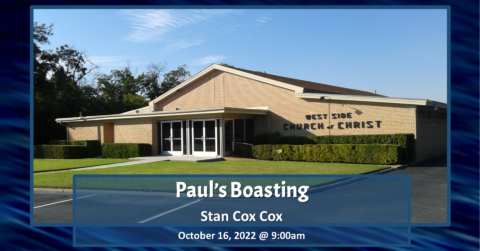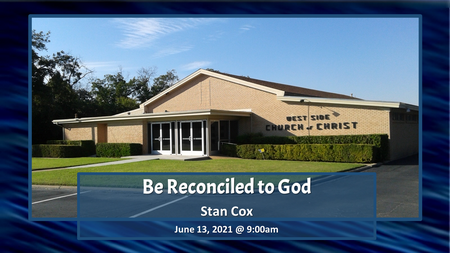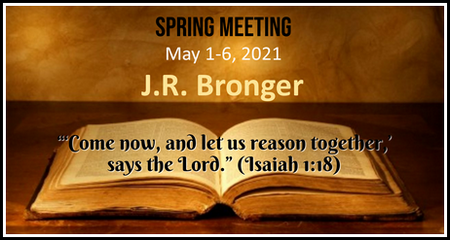Category: Paul
Subject: Paul
Paul’s Farewell to the Ephesians Elders

There is much we can learn from the life of Paul. His previous life, his apostleship and his writings contain much to encourage, teach and admonish us in our own lives.
While our examination of his epistles supply us with much of the doctrine that accords with Christ, there is likewise much to be taken from Luke’s account of his life and ministry. Here we wish to consider his final address to the Ephesian elders in Miletus before going on to Jerusalem. He had spent much time in Ephesus (cf. Acts 19), and no doubt had a close relationship with these men to whom he spoke in Acts 20:18-35. Continue reading “Paul’s Farewell to the Ephesians Elders” →
Paul’s Mission Statement

Paul’s final farewell to the Ephesian elders reveals much about his goals and values as an apostle of Jesus Christ. As we seek to imitate him (cf. 1 Corinthians 11:1), we would do well to examine them and adapt them to our own lives and efforts as Christians.
First, he “served the Lord with all humility” (19). Humble service is a requisite to the Lord’s approval. The Lord “resists the proud, but gives grace to the humble” (James 4:6). It is when we humbly submit to God that we are assured of His acceptance. Continue reading “Paul’s Mission Statement” →
Mining the Scriptures: Philippians 1:19-20

In our text, Paul is unsure of whether he will live or die as he awaits his judgment from Caesar. So, his words, “For I know” should indicate faith rather than certainty. Paul was always willing to accede to God’s plan, but he believed the Lord would want him to continue his ministry to the Philippians and others. “…to remain in the flesh is more needful for you” (24).
Paul believed in the power of the Philippians’ prayers for him. He also believed in the ability and willingness of Jesus Christ to spare Him should he so desire. Paul was also confident that His ministry and life was in accord with the Lord’s will.
As such, his expectation (indicates an intense watching) and hope (desire and expectation) is that his life at present, and that which would follow would lead to God’s approval. He would not be ashamed. There would be no legitimate reproach found in his suffering (cf. 1 Peter 4:16), and God would be glorified both through his life and also his death should he be martyred for the cause.
Mining the Scriptures: Galatians 2:6-10

As Paul continues here his reference to the meeting in Jerusalem recorded in Acts 15, some might think that he writes disparagingly about the apostles and elders in Jerusalem. Those who “seemed to be something”, “it makes no difference to me”, “who seemed to be pillars.” This is absolutely untrue, as Paul was simply using this occasion to again argue for his independent, God given position as an apostle. His standing did not depend upon James, Peter and John and they had nothing to add to the gospel he preached. Despite the efforts of the Judaizers to diminish Paul, he was acknowledged by the other apostles to be an ambassador “toward the Gentiles.”
As such, Paul receive from them the “right hand of fellowship.” Such a shaking of hands was and is now an expression of Christians of our joint participation in the faith of Jesus Christ. Paul was not a usurper, he was an equal partner in God’s work.
Paul was also eager to help the poor, a truth clearly established in the record of scripture, (1 Cor. 16:1-2; 2 Cor. 8-9; Rom. 15:26).
From Saul to Paul

In the apostle Paul’s previous life he was a successful man. A Pharisee of the Pharisees, his zeal for the law commended him to the Jewish leadership. He was a Roman citizen, a student of the respected rabbi Gamaliel, and of the tribe of Benjamin. Among the Jews, these attributes brought him a great deal of respect.
And then, everything changed. The Lord appeared to him while traveling to Damascus (Acts 9), and Saul was confronted by a new reality. The Christians he actively persecuted turned out to be right! Their claim that Jesus was the Christ from God was absolutely true. Saul of Tarsus was actively persecuting the Messiah and his followers.
So Saul changed. This was an indication of his personal integrity. His willingness to acknowledge fault and change direction is perhaps the most laudable thing about the man. As he put it in Philippians 3:7-9, “But what things were gain to me, these I have counted loss for Christ. Yet indeed I also count all things loss for the excellence of the knowledge of Christ Jesus my Lord, for whom I have suffered the loss of all things, and count them as rubbish, that I may gain Christ and be found in Him…”
From Saul the Persecutor to Paul the apostle, he showed himself an honest man, acting with integrity. As such, he earns our respect, and we should seek to emulate him. As Paul wrote, “Imitate me, just as I also imitate Christ” (1 Corinthians 11:1).
Mining the Scriptures: 2 Corinthians 1:15-24

The apostle Paul expressed the reason for his failure to return in person to Corinth following his first letter to the congregation. He states that reason to be “to spare you” (23). It seems that his reconsideration of possible visits was being deemed by some as a fickleness on his part, an indication of flawed character. This was not so.
In everything Paul desired to benefit the Corinthians. So, a change of plans should not be judged harshly. Paul was not lacking in dependability, his plans were not made “lightly” (16). His plans were not a matter of personal whim, that with him should be “Yes, Yes, and No, No” (17). He called upon God as his witness that his communication with the church was not a matter of his own desires, but, (true with his preaching as well), was an effort to help them “stand” in faith (23).
Paul’s efforts did indeed have God as witness. It had the Holy Spirit as a “guarantee” (22). As do others, I believe this “seal” has specific reference to God’s appointment of Paul to his work as an apostle of Jesus Christ, (cf. 1:1, “by the will of God”).
Sermon: Paul’s Boasting

In 2 Corinthians, Paul spends the entire epistle “boasting.” His words are explained by Stan in the lesson.
Sermon: Be Reconciled to God
An exegetical study of 2 Corinthians 5:12-21, explaining the importance of Paul’s ministry, and why we should all be striving for reconciliation with our God!
Sermon: Spring Meeting, 2021 with JR Bronger
JR Bronger from Blue Springs, MO preached a wonderful series of gospel sermons for the West Side congregation, May 1-6, 2021:
Saturday PM: The Conversion of Saul (Acts 9)
- A discussion of the conversion of Saul of Tarsus. A religious terrorist who became a wonderful example of the saving power of God’s grace.
- Facebook Live Video of Sermon
Sunday 1st Service: Evangelizing the World
- In the first century, Christians were able to spread the gospel throughout the known world, despite opposition and challenges. If we have the same mindset today, we can be just as successful!
- Facebook Live Video of Sermon
Sunday Class: Successful Marriages
- Foundational teaching on the subject of marriage. Principles which, if followed, will guarantee strong marriages existing in accord with God’s desire.
- Facebook Live Video of Sermon
Sunday 2nd Service: The Hate of Christ and Christians
- The world hated Jesus Christ because of His mission and righteousness. He promised that the world would hate his followers as well. In our day such hate is prominent.
- Facebook Live Video of Sermon
Monday PM: Christians Are Running a Race
- A runner himself, brother Bronger uses the Hebrew writer’s imagery in Hebrews 12:1-2 to establish a few important truths regarding the race the Christian runs.
- Facebook Live Video of Sermon
Tuesday PM: A Rebel Returns
- A powerful lesson on rebellion and redemption, based on the Parable of the Prodigal Son in Luke 15. Young people need to hear this message!
- Facebook Live Video of Sermon
Wednesday PM: Do You Want to be Made Well?
- If you really wish for spiritual healing, you must stop thinking of yourself as a victim, stop blaming others for your failings, free yourself from fear and recognize the difference between wanting relief, and wanting a cure.
- Facebook Live Video of Sermon
Thursday PM: Hardening of Pharaoh’s Heart
- There were three responsible parties in the hardening of Pharaoh’s heart. God Himself with His demands. The wicked court magicians. And most prominently, Pharaoh himself.
- Facebook Live Video of Sermon
Sermon: The Life of Paul
An examination of the apostle Paul’s life, discussing his persecution of the church, his conversion, his work, and his reward.
Paul’s Bifurcated Life

The apostle Paul’s life had a striking bifurcation. The event which marked the change is narrated by Luke in Acts 9. On that occasion he left Jerusalem to go to Damascus. On the road he met the Lord.
Prior to that meeting Paul, whose Hebrew name was Saul, was a devoted Pharisee. He described himself in the following way. “If anyone else thinks he may have confidence in the flesh, I more so: circumcised the eighth day, of the stock of Israel, of the tribe of Benjamin, a Hebrew of the Hebrews; concerning the law, a Pharisee; concerning zeal, persecuting the church; concerning the righteousness which is in the law, blameless” (Philippians 3:4-6).
Mining the Scriptures: Galatians 1:18-24

As Paul continues the defense of his apostleship begun in verse 11, he notes that the first time he met any of the other apostles was three years after he began his ministry. Further, that on that occasion, Peter was the only apostle he met, during a two week trip to Jerusalem. (vs. 18-19).
Why would he point this out? Because of the Judaizing teachers who claimed that he was usurping his position as an apostle. Perhaps they claimed that Paul was just taking what he had heard, and parroting it while claiming an apostleship he did not deserve.
Paul’s here responds by relating his early ministry. He could not have been parroting the apostles because he hadn’t met or heard them. Instead, as he affirmed in verse 12, “For I neither received it from man, nor was I taught it, but it came through the revelation of Jesus Christ.”
Since the gospel he preached was revealed to him by Jesus Christ, it was authoritative, and to be obeyed by the Galatians (cf. 1:6-9).
Mining the Scriptures: Titus 1:1-4

The apostle Paul wrote this epistle to Titus, “a true son in our common faith” (vs. 4). The salutation indicates that, as with Timothy (cf. 1 Timothy 1:2), Paul’s teaching had led to Titus’ conversion.
It was common for Paul, in his epistles, to defend his apostleship as being from God. Paul was not a usurper. In these few verses he states an eloquent argument for his apostleship, as a part of God’s overreaching scheme of redemption for man.
Paul’s apostleship was according to faith. It emanated from God. He states that God had committed him to the proclamation of that faith. God chose through the “foolishness of the message preached to save those who believe” (1 Corinthians 1:21).
So, the emphasis here is not really on Paul as a bondservant and an apostle, but on the message he was to proclaim. Paul describes that gospel as that which “accords with godliness” (vs. 1). It leads to a holy life. As such, it is “in hope of eternal life.” That is, in leading the elect to righteousness, it provides standing with God in judgment. This eternal hope is something we are assured of, as it is promised by God, and God can not lie (cf. vs. 2, Hebrews 6:18). This promise, as Paul indicated, predates the creation of man (cf. vs. 2).
Mining the Scriptures: Galatians 1:11-17

In the first portion of his letter to the Galatians, Paul emphasized that his apostleship was authorized by God. He asserts the fact in verse 1, and argues the assertion in verses 11-17.
When a careful study is made of Paul’s actions from the time of his conversion, his claims are corroborated. After Paul was converted, as recorded by the historian Luke in Acts 9, he immediately began to preach the gospel of Christ in the synagogues (cf. Acts 9:20). Though the book of Acts does not record the trip to Arabia, it does note that “many days were past” (9:23), and emphasized the preaching done in Damascus. So, as Paul wrote, he did not “immediately confer with flesh and blood, nor did I go up to Jerusalem to those who were apostles before me; but I went to Arabia, and returned again to Damascus” (vs. 16-17).
Why is this significant? First, Paul did not need the apostle’s blessing to begin or accomplish his ministry. The charge he obtained was directly from the Lord (cf. Acts 22:15). Second, the message he preached was not of his own devising, but was revealed to him by the Holy Spirit (cf. Acts 9:15,17; 22:14, Galatians 1:11-12).
Mining the Scriptures: 1 Corinthians 1:1-3

Paul, in greeting the Corinthians in his first epistle to the church there, identifies himself as an “apostle of Jesus Christ through the will of God.” This was his common greeting, necessitated by the Judaizers who constantly attacked his legitimacy as an ambassador of the Lord.
The letter is written to “the church of God which is at Corinth.” This is not a proper name for the church, but rather a phrase designating ownership. The church belongs to God. The church consists of those who have been called out of the world, separated through the shed blood of Jesus Christ. As such, it is proper only to refer to it as belonging to God, or Jesus (cf. Romans 16:16).
The Greek word ekklesia, from which the English term “church” derives, denotes sanctification. The church is called out, or separated from the world. This is accomplished when an individual, by calling “on the name of Jesus Christ”, is cleansed from sin. He is reconciled to God, and is rightly called a saint. This sanctification, as pointed out here by Paul, is accomplished in Jesus Christ. His sacrifice makes us holy, and separates us from the world.







